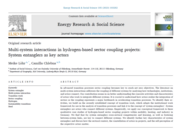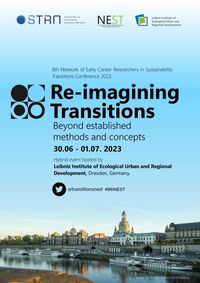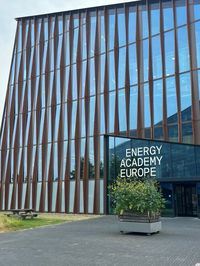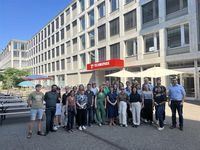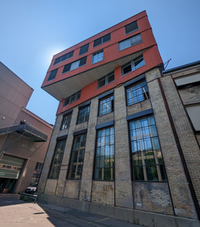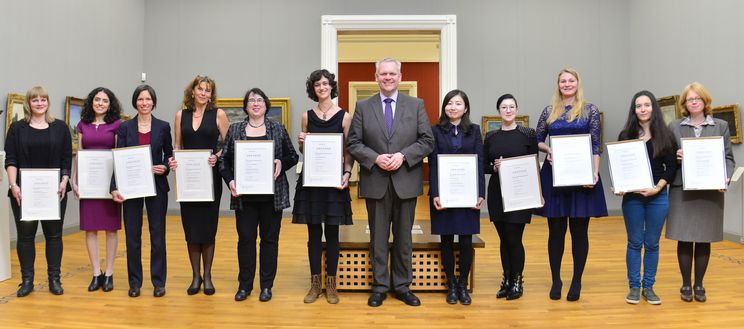Contact
Office:
News
How interdisciplinarity is driving forward the energy transition – impressions from the TEN.efzn annual meeting
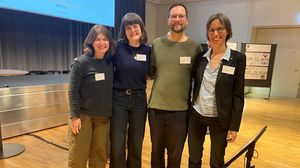
On the 3rd and 4th of December, all employees involved in the TEN.efzn research programme, which was launched last year, came together for their first annual meeting. Under the motto of ‘interdisciplinarity’, the participants engaged in intensive discussions about what has been achieved so far, key findings and the next steps on the path to a common understanding of research.
TEN.efzn stands for the close networking of social sciences, technology and natural sciences. The goal: to not only analyse the transformation of the energy system from a technical perspective, but also to understand it from a social, economic and political perspective, thereby developing viable solutions for a sustainable energy future.
Prof. Dr. Jannika Mattes, who acts as spokesperson for the programme together with Prof. Sebastian Lehnhoff, emphasised in her contribution the special role of the project for the research landscape in Lower Saxony. She highlighted that TEN.efzn, with a total volume of around 58 million euros, ‘offers a unique opportunity to rethink energy research’. According to Mattes, interdisciplinarity is not just a buzzword, but ‘the key to truly understanding the complexity of the energy transition and developing practical, socially acceptable solutions.’
After a successful first year, in which the foundations for interdisciplinary cooperation between the project partners were laid, we are now turning our attention to the next steps: in-depth analysis and upcoming field research, partly in the project's real-world laboratories.
More information on the TEN.efzn research programme can be found here.
The OrgInn working group at the 42nd DGS Congress in Duisburg
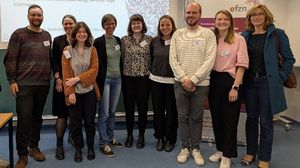
The ‘Organisation and Innovation’ working group was represented at the 42nd DGS Congress in Duisburg from 22 to 26 September 2025, one of the central sociological conferences in the German-speaking world. This year, the congress focused on transitions and provided a forum for exchange on social, technological and institutional transformation processes.
As part of the TEN.efzn research network, Emily Drewing and Jannika Mattes, together with colleagues from SOFI Göttingen, initiated an ad hoc group on the topic of ‘Energy Transitions: Attempts at a Decidedly Socio-Technical Perspective.’ In the session, Florian Helfrich, Lea Schnackenberg and Miriam Doderer presented their contributions on key aspects of the energy transition, including actor dynamics in decentralised energy infrastructures, the role of actors in coupling different sectors, and the socio-technical-ecological characteristics of offshore wind energy.
The working group was also represented in the plenary programme: Jannika Mattes, Tamara Schnell and Ricarda Schmidt-Scheele gave a presentation entitled ‘Legitimacy in Transition: Complex Socio-Technical Dynamics in the Energy Transition’ in the plenary session on the dynamics of the energy transition, standards, infrastructures and participation. The focus was on the negotiation of legitimacy in socio-technical transformation processes, a topic that met with great interest in the plenary session.
The DGS Congress offered a varied scientific programme and numerous opportunities for professional and informal exchange. Participation strengthens the working group's national visibility in debates on socio-technical transformations and demonstrates the working group's active role in shaping current research topics.
What does it mean to be a postdoc? Scientists at UOL share their experiences!

Dr Ricarda Schmidt-Scheele contributed to the information video produced by the Graduate Academy at the University of Oldenburg.
https://www.youtube.com/watch?v=ZoX8gVqhWAY
Being a postdoc is both rewarding and challenging. Writing, teaching, supervision – postdocs are on their journey to becoming independent researchers. The trick is to find a balance between the passion for one's own research and the fulfilling support of students on the one hand, and the demands of temporal and spatial flexibility and the expectations of the academic market on the other.
28.05.2025 Presentation on organisations in transition at the workshop ‘Transitions and Organizations’

Emily Drewing took part in the workshop ‘Transitions and Organizations: Exploring the Complexities of Change’ at the University of Innsbruck on 28 May 2025. In her presentation "Roles played. How organisations navigate regional energy transitions", she presented an idea developed together with Jannika Mattes to explain organisational action in regional energy transitions. The workshop brought together different approaches and perspectives from organisational studies and transition studies, from which a joint publication project is to emerge in the future.
29. & 30.05. TEN.efzn doctoral students present at NEST 2025 in Brighton
On 29 and 30 May 2025, this year's NEST conference (Network for Early Career Researchers in Sustainability Transitions) took place in Brighton, UK. Our doctoral students Miriam Doderer and Lea Schnackenberg from the TEN.efzn project were also there to present their current research work and provide exciting insights into their dissertation projects.
Miriam Doderer presented a literature review that she is working on together with Emily Drewing and Jannika Mattes. The paper analyses the existing research results on offshore wind energy in the context of the energy transition.
Lea Schnackenberg presented the status of her first dissertation paper, which she wrote with Jannikas Mattes and which focusses on the role of actors at system interfaces in multi-system interactions.
Miriam and Lea were accompanied by their colleagues Anna Theis and Adelheid Böckmann, who are also doctoral students in the TEN.efzn project and work at the University of Vechta. The joint trip not only provided an opportunity for professional exchange, but also for further networking within the international community of young sustainability researchers.
We are delighted with the strong presence of our young female researchers at NEST 2025 and the valuable input they contributed to the discussions.
Translated with DeepL.com (free version)
Kick-off Workshop Launches UOL–RUG Collaboration on Digitalisation and Sustainable Energy Transitions

On 16 May 2025, the first workshop of a new bilateral research collaboration between Carl von Ossietzky Universität Oldenburg and Rijksuniversiteit Groningen took place at the Institute for Social Sciences (IFSOL) in Oldenburg. The project, titled "Couplings between digitalisation and sustainable energy transitions", was initiated by Ricarda Schmidt-Scheele (IFSOL, Oldenburg) and Paul Upham (IREES, Groningen), and is co-funded by both universities under the UOL | RUG cooperation programme.
Participants in the kick-off workshop included Paul Upham and Xin Sun from the Energy and Sustainability Research Institute Groningen (IREES), as well as Tamara Schnell, Jannika Mattes, and Ricarda Schmidt-Scheele from the Institute for Social Sciences in Oldenburg. The workshop laid the foundation for the collaboration, providing space for participants to get to know each other’s research, share perspectives, and jointly brainstorm ideas for future research projects and publications.
Two further workshops—one in Groningen and another in Oldenburg—are scheduled to follow. The collaboration aims to contribute conceptually and empirically to the emerging intersection of digitalisation and sustainable energy transitions, with planned outcomes including a joint publication.
08.04.2025 New EIST publication: An actor-centred policy mix approach
We are excited to announce the publication of our article "Tracing actors in policy mixes for transitions: A systematic literature review and insights from policy process theories" in EIST.
Actors play a crucial role in transition and policy processes. We examine how actors have been conceptualised in the literature on policy mixes for sustainability transitions, noting that explicit conceptualisations of actors in policy mixes remain scarce.
Drawing on policy process theories such as the Advocacy Coalition Framework and the Multiple Streams Framework, we propose an actor-centred policy mix approach to better understand, analyse, and shape multi-actor, multi-policy, and multi-system settings.
Read the full article here: https://www.sciencedirect.com/science/article/pii/S2210422425000280
26.02.2025 Lecture “Success factor digitalization?” - How digital technologies are changing power relations and social dynamics of the energy transition.

Prof. Dr. Jannika Mattes gave a lecture at the Centre for Digital Innovations Lower Saxony on the topic "Success Factor Digitalisation? - How digital technologies are changing power relations and the social dynamics of the energy transition.
22.10.2024 WindGISKI results workshop in Hanover: Together with its project partners, the OrgInn working group presents its research results

The results workshop of the three-year WindGISKI research project took place in Hanover on October 22, 2024. A total of eight project partners from science and practice were involved in this project - including the Institute of Social Sciences at the University of Oldenburg. The aim of the research project was to find out to what extent artificial intelligence (AI) can be used in the search for and designation of potential areas for wind energy. To this end, an AI-based geographical information system (GIS) was developed and presented in a demo version. For this AI tool, Germany was divided into 50x50 meter tiles and the AI was trained to evaluate the tiles according to their suitability for wind power locations. Even though this demo version already illustrates the potential of using AI in this area, further steps would be necessary to develop a market-ready product. More information can be found here.
15.10.24 Project start - Research platform “Social Dynamics of Energy Transformation” in the research program “Transformation of the Energy System of Lower Saxony” (TEN.efzn)
The new research program of the Energy Research Center of Lower Saxony (EFZN) “Transformation of the Energy System of Lower Saxony” (TEN.efzn) is giving energy research in Lower Saxony a new boost. Jannika Mattes is involved in this interdisciplinary joint project with four new positions and in several roles: Firstly, together with Berthold Vogel (SOFI Göttingen), she heads the research platform “Social Dynamics of Energy Transformation”. On the other hand, she is involved as PI in the research platform “Trustworthy digitalization of safety-critical energy systems”. Finally, she was elected as deputy chair of the steering committee for the entire consortium at the kick-off in Hanover.
The OrgInn working group is looking forward to working together on the TEN.efzn project and strengthening the team!
09.10.2024 Fellow Lecture by Ricarda Schmidt-Scheele at the Hanse Wissenschaftskolleg, Institute for Advanced Study (HWK)

As part of her three-year Associate Junior Fellowship at the HWK, Ricarda Schmidt-Scheele held a Fellow Lecture on site. The topic of the lecture was the complex interactions between digitalisation processes and sustainable energy transitions. Ricarda Schmidt-Scheele took the opportunity to present the current state of her research and to discuss it with other Fellows and alumni of the institute. Previous research approaches have mostly focussed on the various effects of digital technologies on the transition process. The core of Ricarda Schmidt-Scheele's research is to better understand the reverse relationship: How are current transition dynamics in the energy sector being inscribed in the design and functionality of new, digital technologies. She also presented preliminary results of an ongoing case study on AI-based automated bird detection and curtailment systems for onshore wind power plants.
06/09/2024: ForWind alumni seminar and panel discussion with Ricarda Schmidt-Scheele
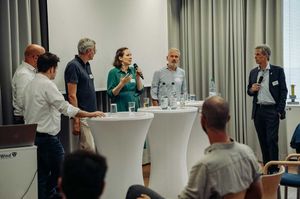
An annual seminar for alumni of the Oldenburg Wind Studies programme took place at the Centre for Wind Energy Research (ForWind) at the beginning of September. This year's topic was “Energy transition and electricity grids: How can the bottleneck be overcome?” In April of this year, the Bundesverband Erneuerbare Energie e.V. and the Fraunhofer Institut für Energiewirtschaft und Energiesystemtechnik published a study on the joint use of grid connection points by renewable energy producers, electricity storage facilities and sector coupling systems. The study shows the challenges and potential that lie in this more efficient utilisation of the grid infrastructure. After some presentations, the results of this study were discussed with the alumni in a panel discussion with Ricarda Schmidt-Scheele and other experts.
2024: Chlebna, Camilla & Mattes, Jannika: Regional Transition Fields - Exploring institutional dynamics of contestation and entrenchment in an energy transition case in Germany.
Energy Research & Social Science.
In the context of regional energy transitions entrenched positions between involved actors are empirically observable but we lack a regionally specific theoretical foundation to grasp and explain them. The study suggests the concept of ‘Regional Transition Fields’ (RTF) which encompass all actors, activities and organisations in a region that share a concern for the energy transition. This approach allows consideration of both those actors that promote an energy transition towards more sustainable energy sources and those that oppose it as part of the same field. The study argues that, despite the apparent agreement on the issue at stake, conflicts and tensions arise within that field concerning the rules, regulations, and common reference frames against which behaviours are judged. The framework posits that processes of adaptation and delimitation continually re-shape the structure of the field. The framework is applied to a qualitative in-depth case study of Northern Hesse in Germany. Based on a content analysis of semi-structured interviews the study offers evidence of the existence of a regional transition field, briefly introduces the key actors and actor constellations in this field, and illustrates the regulative, normative, and cultural-cognitive dimensions of both adaptation and delimitation processes in this case. The study thus contributes a conceptual framework on how institutionalisation occurs in fields and thereby a more nuanced understanding of the emergence of entrenched positions in regional transition fields, which may inform future studies of regional energy transitions.
Uni-INFO July 2024: Fragile energy transition
Wherever a wind farm is planned, there is often protest. Yet the energy transition cannot succeed without local acceptance. Social scientist Jannika Mattes has researched the conditions that lead to the success of wind energy projects in various regions.
Please read the full article in Uni Info from July 2024 on page 4.
16.-20.06.2024 International Sustainability Transitions Conference in Oslo
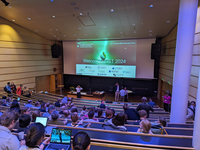
16th to 20th June 2024 International Sustainability Transitions Conference in Oslo
This year's International Sustainability Conference IST took place in Oslo, Norway, under the topic ‘Sustainability Transitions and Nature’. Over 500 scientists from a wide range of disciplines dedicated to researching transitions participated in the conference. Over three days, in around 80 sessions with 3-8 presentations per session, the participants discussed and exchanged views on their research topics as well as scientific and societal challenges. Our ‘Organization and Innovation’ working group was also represented again this year with numerous contributions.
Jannika Mattes presented her current work with Ricarda Schmidt-Scheele under the title: ‘Interdependence between energy transitions and digital technologies: Socio-technical-ecological configurations of intelligent bird detection technologies’. In this paper, they analyse how current energy transition dynamics shape and are inscribed into the design and functionality of digital technologies. Tamara Schnell presented the second paper of her dissertation entitled: ‘Legitimacy of Transitions - Transitions of Legitimacy: Uncovering (de)institutionalization dynamics in sustainability transitions’. In the paper, she develops a framework for analyzing legitimation dynamics in transitions. In her presentation, Marie Oltmer discussed the question of what role different actor constellations play in the policy process for insect conservation. She presented the joint paper by her and Camilla Chlebna entitled: ‘Putting insects on the agenda: An analysis of actors in multiple streams towards a policy mix for insect conservation in Germany’. Also present was our external PhD student, Sven Alsheimer, who presented his paper on ‘Divergent or convergent? Acceptance of CCUS at regional and national levels’. We also met our former colleagues Camilla Chlebna and Meike Löhr at the conference and were able to discuss their current work.
21.03.2024 REENEA - Final report
English Summary
Change in the energy system goes hand in hand with the development of renewable energies and becomes visible through the diffusion of these technologies. Profound technological, economic and also social restructuring is associated with this "energy transition". Different actors are involved, they have to negotiate compromises, create standards and routines and acquire new knowledge. Often, these processes are analyzed on a general, national level. However, this perspective neglects processes at the local and regional level, which can be understood as the basis of this very heterogenous change process. This is where REENEA came in and – starting from the wind energy sector as an exemplary part of the energy transition – examined the social dynamics and regional differences of the energy transition. In recent years, the wind industry has increasingly evolved into a global sector within national, European and international contexts. At the same time, however, the industry remains regionally anchored: economic clusters form in which manufacturers, service providers, suppliers and research institutions cooperate; solutions for energy storage or sector coupling are being tested at locations with a lot of wind energy; jobs are being created and new industries or wind farms are becoming important sources of tax revenue for municipalities. But also social conflicts about the acceptance or the locations of wind turbines occur on the local level. The REENEA team's findings underscore the importance of social interactions that significantly shape the course and success of regional energy transitions. In particular, (absent) actor activities that consolidate and institutionalize the transition process explain differences in the development of (regional) transitions. Effective informal and formal collaborations of committed actors enabled some regions to develop into successful and broad-based wind energy sites. However, these successes are not automatically permanent at the regional level but can potentially be eroded at any stage of development by changes in external framework conditions. Regional actors have to deal with such changes, which can both accelerate and slow down the transition process. The importance of regional networks and institutions differs depending on the value creation position: While plant manufacturers, for example, are increasingly dependent on international markets, it is important for project developers to know local stakeholders in order to secure local land and obtain permits. If regional decision-makers perceive project development agencies and landowners as regionally anchored, this contributes significantly to the acceptance and legitimacy of wind energy development.
20./21.11.2023 Tamara Schnell gives a presentation at the 15th Lower Saxony Energy Days
This year's Lower Saxony Energy Days took place in Hanover on 20 and 21 November 2023. Under the motto „The energy transition happens locally – it depends on the municipalities“ stakeholders from society, politics, administration, business and science came together to discuss the role of municipalities in the energy transition in Germany. Our working group, too, was represented by Tamara Schnell.
 "Over the two days, I was able to exchange ideas with experts from a wide range of fields and talk in depth about the challenges that local authorities are facing with regard to the energy transition." Tamara Schnell
"Over the two days, I was able to exchange ideas with experts from a wide range of fields and talk in depth about the challenges that local authorities are facing with regard to the energy transition." Tamara Schnell
Right at the start of the event, it was clearly emphasised that the "quota of complaints for this year has already been used up" and that the conference should therefore be a platform for constructive solutions. Under this motto, the participants came together in four specialist forums. In each one four solution approaches were discussed. Tamara Schnell made a contribution in specialist forum 4: "Opportunities of energy transformation for rural areas - between value creation, innovation and participation".
In her presentation on "The Social" in wind power projects, she used examples from the case studies of the WindGISKI research project to explain the extent to which social dynamics can be analysed from a sociological perspective on the basis of legitimisation processes. This allows municipalities to be understood as part of a multi-level system, which is characterised by institutional orders that are also transformed in transitions. As the topic of "acceptance" was repeatedly identified as a key problem at the conference, Tamara was able to address this issue in her presentation and present an alternative way of looking at social dynamics - true to the motto "less complaining, more constructive solutions".
At the end of the conference, the results from the four specialist forums were gathered in a fishbowl discussion and discussed with Christian Meyer, Lower Saxony's Minister for the Environment, Energy and Climate Protection, and the moderators of the specialist forums.
22.09. Prof. Dr. Jannika Mattes as a specialist in the panel ‘Participation’
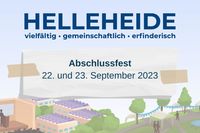
The research project „EnaQ Energetisches Nachbarschaftsquartier” invites experts in the fields of economy, science, education and politics to discuss the results, challenges and findings from six years of project duration. Prof. Dr. Jannika Mattes joins as a specialist in the panel ‘Participation’ on Friday, 22nd September 2023. Please find more information on the final party and registration here.
New paper on sector coupling published
In their paper "Multi-system interactions in hydrogen-based sector coupling projects: System entanglers as key actors", Meike Löhr and Camilla Chlebna identify so-called "system entanglers" as key actors connecting multiple sectors. Based on three hydrogen projects from the mobility, heat and industry sectors, they analyse how these actors contribute to the coupling of multiple systems and define their core characteristics and competencies: Central to this are the development of cross-sectoral competencies and cross-sectoral learning processes, as well as the active creation and fostering of between-system links. They also show that the actor constellation, the sectoral context and self-perception as a system entangler have an essential impact on successfully linking different sectors.
The paper is available for the next 50 days at this link: https://authors.elsevier.com/a/1hlhQ7tZ6Z-FaS
International Sustainability Conference (IST) 2023 in Utrecht
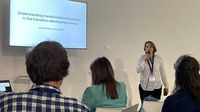
At this year's IST conference, several researchers from our research group in Oldenburg presented their work. Meike Löhr and Camilla Chlebna presented their paper on "Multi-system interactions in hydrogen-based sector coupling projects: System entanglers as key actors", which deals with the actors who work at the intersection of two sectors and contribute to coupling them, among other things, through cross-sectoral competencies. The respective paper is about to be published. Camilla Chlebna and Jannika Mattes presented their work on "Regional transition fields: how processes of adaptation and delimitation shape regional transitions". They develop a concept, rooted in organisational institutionalism, which contributes to explaining the often entrenched positions of actors in regional energy transitions. Sven Alsheimer, Tamara Schnell, Camilla Chlebna and Sebastian Rohe presented their literature review on the often used but seldomly defined terms legitimacy and acceptance entitled "Competing terms for complementary concepts? A systematic literature review on social acceptance and legitimacy of low-carbon technologies". The respective paper is about to be submitted to a journal. Camilla Chlebna also seized the opportunity to present ongoing work with Johannes Suitner in a short presentation about the tension between (growth oriented) regional development and sustainable transitions.
The IST was hosted by the Copernicus Institute of Sustainable Development and took place under the theme "Responsibility & Reflexivity in Transitions" from 30.08.2023 to 01.09.2023 in Utrecht.
30th June – 1st July 2023 NEST Conference in Dresden
End of June Marie Oltmer participated in the 8th NEST Conference in beautiful Dresden. The NEST Conference is a conference for early career researchers working in the field of transition studies (and beyond). This year’s conference topic was „Re-imagining Transitions – Beyond established methods and concepts“. The two keynotes by Martin Savransky and Zora Kovacic were very much in line with the conference’s theme. Marie Oltmer presented a paper project about insect conservation policy in Germany with a focus on the role of actors – more specifically the role of the so-called policy broker – in policy processes for transition. The hybrid format of the conference allowed online, as well as offline participants to discuss the multi-faceted works of the different participants. Topics such as ‘policy of transitions’, ‘transitions in agriculture and food‘, and ‘actors and organisations in transitions’ were only some of the various topics. Besides the presentations of participants, exchange was facilitated also during workshops, poster sessions and of course during the coffee breaks.
26.06.2023 Jannika Mattes: "Social dynamics of the (regional) energy transition"
Everyone is talking about energy transition. But the underlying processes are still not running as smoothly as would be expected from a technical perspective. That is why social science is analyzing who actually shapes and determines energy transitions: Which actors are involved, which interests do they represent, and how are they negotiated?
The lecture will take place at 7:30 p.m. at the Schlaues Haus in Oldenburg
20.-21.06.2023 Second International Conference on New Pathways for a Just and Inclusive Energy Transition
The working group Organization and Innovation was represented twice at the conference "Second International Conference on New Pathways for a Just and Inclusive Energy Transition: Connecting Multiple Stakeholders and Levels" at the University of Groningen. From 20-21.06.2023, energy transitions were intensively discussed. The focus was on topics such as inclusion and inequalities, energy transition 'from below' or regulations. Tamara Schnell and Sabrina Paustian each presented current work projects with other colleagues. The Energy Academy Europe location was particularly impressive. The building is considered one of the most sustainable in the Netherlands and offers exchange opportunities between business and science to help shape the energy system of the future.
2023: Sabrina Paustian, Julia Köhlke, Jannika Mattes und Sebastian Lehnhoff
'Ready, Set, Rollout…? Zur Bedeutung von heterogenen Akteuren bei er Verzögerung des Smart Meter Rollouts in Deutschland' Aktuelle Perspektiven der Wissenschafts- und Technikforschung Frühjahrstagung der Sektion Wissenschafts- und Technikforschung der Deutschen Gesellschaft für Soziologie, TU Dortmund , 04.-05.05.2023.
2023: Tamara Schell, Jannika Mattes
2023: Tamara Schell, Jannika Mattes 'Legitimacy gaps in energy transition. Institutional misalignments in wind energy projects‘ Second International Conference on New Pathways for a Just and Inclusive Energy Transition: Connecting Multiple Stakeholders and Levels, University of Groningen, 20.-21.06.2023.
05.06.2023 STRN/NEST Method School in Winterthur
During the week of June 5-9, Tamara Schnell participated in the STRN/NEST Method School in Winterthur, Switzerland. She was one of 28 young international researchers who came together to share their views on different transition research methods and practices. They were invited by representatives of the STRN and NEST research networks, which promote exchanges between young and established researchers.
"Participating in the methods school was a very special experience for me. First, meeting the scientists whose work and contributions I deal with on a daily basis. Learning from these people and their experiences and being able to discuss my open questions with them gave me a lot of impulses for my work and research. Secondly, the exchange with other young scientists and PhD students from different countries. I'm really grateful for every input and conversation - during the presentations, at lunch, or in the evening over a drink after we've spent 9-10 hours on the topics of sustainable transitions and there was still a lot to talk about." - Tamara Schnell
2023: Sabrina Paustian, Julia Köhlke, Jannika Mattes und Sebastian Lehnhoff
'Ready, Set, Rollout…? Zur Bedeutung von heterogenen Akteuren bei der Verzögerung des Smart Meter Rollouts in Deutschland' Aktuelle Perspektiven der Wissenschafts- und Technikforschung Frühjahrstagung der Sektion Wissenschafts- und Technikforschung der Deutschen Gesellschaft für Soziologie, TU Dortmund , 04.-05.05.2023.
23.03.2023 Jannika Mattes NEST-Webinar "Regional Energy Transitions"
The webinar of the NEST webinar series by Prof. Dr. Jannika Mattes on the topic "Regional Energy Transition" took place on Thursday, March 23 at 10:30 CET.
You can find the video here
Hydrogen discourse in Germany
New article published in EIST
In this article, Nils Ohlendorf, Meike Löhr and Jochen Markard examine the conflicts and multi-sectoral dynamics around the topic of hydrogen on the basis of the hydrogen discourse in Germany. Based on a discourse analysis of 179 newspaper articles from five major German newspapers, we show that most actors are in favour of the use of hydrogen for decarbonisation. Sceptical voices emphasise that hydrogen will remain expensive and only conditionally available in the medium term.
Initial conflicts emerge on three issues: the production of hydrogen (green vs. blue), the application of hydrogen (mainly in hard-to-decarbonise-sectors or in all sectors) and imports.
Our conceptual contribution shows how the discourse on hydrogen technologies is influenced by developments in the heat and gas, industry, transport and electricity sectors. We argue that actor positions in the discourse are influenced by 1) the sectoral context, 2) sector-specific technologies, and 3) strategic actor interests. With our article we contribute to the debate on multi-system interactions.
The article can be found here: bit.ly/3SW57BD – or just contact us.
2023: Sebastian Rohe, Ricarda Schmidt-Scheele & Jannika Mattes: The embeddedness of companies in regional energy transitions, European Planning Studies
03.02.2023: PhD Day Groningen – Sustainable path: Planting seed for innovation
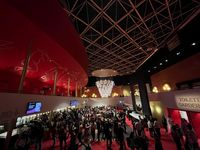
Together with about 800 other PhD students from the Netherlands and Germany, Marie Oltmer, Tamara Schnell and Sabrina Paustian spent a day dealing with the topic of doctoral studies. For once, the focus of this year's PhD Day on February 3, 2023 in Groningen was not on technical content. Instead, topics such as presentation techniques, mental health, interdisciplinarity and further career paths after the PhD were discussed and debated in detail in various workshops and lectures.
Project funding
To continue their joint work, Camilla Chlebna (now Christian-Albrechts-Universität zu Kiel) and Jannika Mattes have applied for and been granted funding within the framework of the "Impuls Forschung" call of the Association of North German Universities. Both are looking forward to further cooperation, in which they will build on existing preliminary work from the REENEA project and in which the social dynamics of the regional energy transition will continue to be of central interest.
2023: Roth, Philipp & Mattes, Jannika: Distance creates proximity: Unraveling the influence of geographical distance on social proximity in interorganizational collaborations. Environment and Planning A: Economy and Space
21-25.11.2022 IST Conference 2022
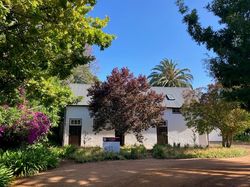
At this year's International Sustainability Transitions Conference (IST), Meike Löhr gave three presentations on two different paper projects, both, for the online community and in person. A joint paper together with Jochen Markard and Nils Ohlendorf on hydrogen coalitions in Germany investigates the emergence of a new policy subsystem using hydrogen as an example. Actors from a wide range of sectors share numerous positions on hydrogen and its importance for the energy transition, but differ on the production, use and import of hydrogen.
Furthermore, Meike Löhr presented the joint article with Camilla Chlebna on sector coupling using the example of hydrogen projects in the industrial, transport and gas sectors. Here it is actors working at the interface of the energy sector with one of the mentioned sectors who - equipped with cross-sector competences - make a difference in the realisation of sector coupling projects.
The IST took place from 21-25.11.2022 as a hybrid conference. It was hosted by three partners, Stellenbosch University in South Africa, Monash University in Australia, and Georgetown University in the USA.
16.11.2022: Jannika Mattes gives a lecture on "Social Dynamics of the (Regional) Energy Transition" as part of the TU for future lecture series at the Technical University of Braunschweig
Everyone is talking about energy transition. But the underlying processes are still not running as smoothly as would be expected from a technical perspective. That is why social science is analyzing who actually shapes and determines energy transitions: Which actors are involved, which interests do they represent, and how are these negotiated? What institutional structures need to change in the context of energy transition, and why is this so difficult? Energy transition does not happen by itself, but is worked out in small steps by the actors involved and only gradually transformed into fixed, reliable structures. Using the example of wind energy expansion, we can show that energy transition is lived very differently from region to region and remains surprisingly fragile even in advanced phases.
You can find the entire lecture at https://www.youtube.com/watch?v=0LZJCDKm1fk
Research stay at TIK at the University of Oslo
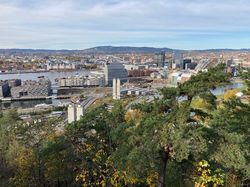
For three weeks starting in mid-October, Meike Löhr went to Norway to the TIK (Centre for Technology, Innovation and Culture) at the University of Oslo. In exchange with Allan Dahl Andersen and colleagues, she discussed research on sector coupling and multi-system interactions. These discussions were deepened during the one-day workshop "Cross-system agency in transitions", for which Meike Löhr presented the paper "Hydrogen-based sector coupling in Germany - a transition work perspective", which she developed together with Camilla Chlebna. At the TIK Institute Colloquium (innovation lunch) she also presented the joint paper with Camilla Chlebna and Jannika Mattes: "From institutional to transition work: Actors creating, maintaining and disrupting transition processes". She also took the opportunity to exchange with colleagues at the Fridtjof Nansen Institute, at SINTEF and the Mohn Centre of the University of Applied Sciences Western Norway in Bergen where she presented her research on hydrogen coalitions in Germany in the "out of the box" seminar.
With three lectures and numerous opportunities for exchange, the research stay was a very intensive, exciting and enriching opportunity.
Rohe, Sebastian; Oltmer, Marie; Wolter, Hendrik; Gmeiner, Nina; Tschersich, Julia (2022): Forever niche: Why do organically bred vegetable varieties not diffuse? In: Environmental Innovation and Societal Transitions, 45, 83-100,
Research visit Scandinavia
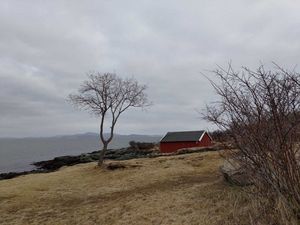
Between semesters, Camilla Chlebna took the opportunity for a three-month research stay in Denmark at the Institute for Food and Resource Economics (IFRO) at the University of Copenhagen with Teis Hansen. The purpose was to work on her personal development, as well as to explore common interests that could be the basis for a closer collaboration in the future. Alongside, Camilla enjoyed the exchange with colleagues from a wide range of disciplines working on sustainability in the wider field of food systems and resources.
Camilla Chlebna also seized the opportunity to visit other scientific colleagues in Scandinavia and traveled to Norway for two weeks. For one week she was able to explore Trondheim, enjoyed the exchange with a very engaged group of PhD students in a PhD course and exchanged ideas with Asbjørn Karlsen from the Department for Geography at NTNU and Markus Steen from SINTEF Digital. During the weekend, she was able to explore the impressively wild landscape of the surrounding area on foot. She continued by ferry to Bergen, where she was hosted by Lars Coenen and numerous colleagues in the field of transition geography at the Mohn Centre for Innovation. Here, too, there was time on the weekend to climb one of Bergen's seven local mountains. There she even experienced a snowstorm at the beginning of April. Furthermore, Camilla was a guest at the department of Geography at Lund University with Markus Grillitsch and Josephine Rekers for one day.
The eventful three months flew by and were very helpful, which is also reflected in ongoing plans for projects and initiatives.
Organizing: The Beauty of Imperfection – 38th Colloquium of the European Group for Organizational Studies (EGOS), Vienna, 7. – 9. July 2022
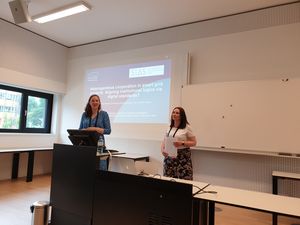
Under the theme „Organizing: The Beauty of Imperfection”, this year’s Colloquium of the European Group for Organizational Studies (EGOS) took place at the Vienna University of Economics and Business. Following stringent hygiene regulations, the conference was perfectly organized on site.
Sabrina Paustian, Ricarda Schmidt-Scheele and Jannika Mattes presented their current research as part of the colloquium’s sub-theme „Digital Technology, Societal Change and Shifts in Institutional Logics”. Their work entitled “Heterogeneous cooperation in smart grid projects: Bridging institutional logics via digital standards?” dealt with digitalization processes of the energy sector – particularly with the development of smart grids. Here new actor constellations and approaches lead to challenges in inter-organizational collaboration. In these processes, IT-standards play an increasingly important role as they are implemented to serve as an interlinkage between the heterogenous actors. Findings of the research team, however, suggest that the investigated standard only partly enables an alignment of actors’ diverging values, beliefs and working styles. Thereby, the research seeks to contribute to a better understanding of the difficult institutionalization processes involved in complex innovation projects.
Despite the size of the EGOS colloquium, the sub-theme made possible an intensive exchange between about 40 international scholars throughout the entire duration of the colloquium. Institutional theory as a common ground of all scholars in the sub-theme further contributed to in-depth conversations and constructive discussions.
More information about the colloquium: www.egos.org/2022_Vienna/General-Theme
How do networking organizations and their role evolve as regional transitions advance?
Shortly before the summer break, the newest REENEA research on "The evolving role of networking organizations in sustainability transitions" has been published. In the paper, Sebastian Rohe and Camilla Chlebna analyze two regional energy networks: The Oldenburger Energiecluster OLEC e.V. and the deENet Kompetenznetzwerk dezentrale Energietechnologien e. V. from Northern Hesse.
Methodologically, Sebastian and Camilla combine interviews with experts and stakeholders from inside and outside the networking organizations with a social network analysis of the network members and their connections (expressed in joint participation of events and meetings).
The paper investigates what role OLEC and deENet played for their respective energy transitions, how the structure of both networking organizations changed over time, what kinds of tensions went along with these changes, and how policy makers and network managers might address these challenges. With this research, the REENEA team further contributions to debates around sustainability transitions, specially on transition intermediaries and the role of networks in evolving Technological Innovation Systems.
Our article is published in Technological Forecasting and Social Change: doi.org/10.1016/j.techfore.2022.121916
You can download it for free until 19th September 2022 following this link: authors.elsevier.com/a/1fVT998SGstkV
If you are interested in reading it after this date, please do not hesitate to contact us.
Conference trip and visit to the water research institute EAWAG in Zurich
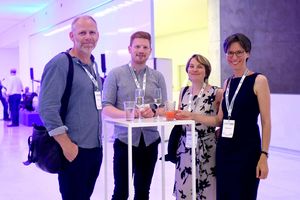
In early July, Jannika Mattes, Sebastian Rohe and Camilla Chlebna attended the 5th Geography of Innovation Conference in Milan around topics related to the geography of innovation. Sebastian Rohe presented a paper with Ricarda Schmidt-Scheele and Jannika Mattes on the regional embeddedness of firms which is currently under review at a top-tier journal. Jannika Mattes presented a paper with Camilla Chlebna and Hanna Martin on the role of ecological boundaries and social dynamics in common concepts of regional industrial change which is also under review at a top-tier journal. Both papers were presented as part of a well-attended special session entitled “The multi-scalar geography of sustainability transitions: Exploring interfaces between sectoral and regional innovation dynamics” which Sebastian Rohe and Jannika Mattes had organized with Christian Binz and Johan Miörner, EAWAG, and Markus Steen, SINTEF Digital. Unfortunately, there was little time for extensive tourist activities in Milan due to the intensive program, but there was all the more opportunity for personal exchange with colleagues in the field after the long Covid-induced break.
Camilla Chlebna then continued her journey to Dübendorf near Zurich to continue the exchange with colleagues Christian Binz and Bernhard Truffer from the EAWAG water research institute. After a short tour of the impressive EAWAG building, which after 15 years is still a beacon of sustainable construction, including a visit to the urine treatment facilities and the fresh air intake for passive cooling and heating in the basement, there was plenty of time for exchange around future joint initiatives, career prospects in science and the problems of publishing.
Can a digital society be sustainable? Conference in Passau (23.-24.06.2022)
Can a digital society be sustainable? Conference in Passau (23.-24.06.2022)
After a long time of digital conferences, we attended the first conference on site again. The DGS working group Soziologie der Nachhaltigkeit organized, together with the other groups Arbeits- und Industriesoziologie, Wissenschafts- und Technikforschung, Umwelt- und Nachhaltigkeitssoziologie, Organisationssoziologie sowie Religionssoziologie the conference Kann eine digitale Gesellschaft nachhaltig sein? Soziologische Perspektiven auf die Wechselwirkungen von gesellschaftlicher Transformation, Technik und Natur at the University of Passau.
Scholars spent two days discussing the topic from various theoretical and empirical perspectives. Sabrina Paustian presented a paper co-authored with Ricarda Schmidt-Scheele and Jannika Mattes. The presentation, titled "Heterogeneous cooperation in smart grid projects: bridging institutional logics via digital standards?" was about digitalization in the energy sector towards a more sustainable energy system. The development of smart grids leads to novel actor constellations and approaches of inter-organizational collaboration. In this process, standards have a special role, because they act as a link between the actors and thus aim to align different points of view and ways of working.
Despite the wide variety of contributions, the participants were able to identify numerous commonalities and parallels in their work. In our society, sustainability is not only closely linked to the idea of greater efficiency. Rather, the role of digitization in this process also varies. Does it reinforce this process or does it also promote more inequalities at the same time?
04.-06.07.2022: 6th Geography of Innovation Conference (GeoInno2022) Mailand, Italien.
Sebastian Rohe, Ricarda Schmidt-Scheele, Jannika Mattes: ‘The embeddedness of companies in regional energy transitions’ 6th Geography of Innovation Conference (GeoInno2022). Mailand, Italien. 04.-06.07.2022
New publication from the SEAS Project: The (still unexplored) Social Side of Smart Grid Development. Towards a Social Layer for the SGAM
Technology development involves much more than just technology itself - even if IT standards are applied. In their recently published paper, Sabrina Paustian, Julia Köhlke, Jannika Mattes and Sebastian Lehnhoff from the SEAS project show why social processes also need to be considered in smart grid development processes and how they can be integrated into existing IT architecture models.
Abstract: Smart Grids interconnect stakeholders and technologies in the energy domain for the sake of enabling new ways of interacting within the energy system through the usage of information and communication technologies. However, the facilitation of new business models and competition in the energy domain is not purely a technological issue. Besides technological complexity, stakeholders with different knowledge, expertise, and methods are necessary for Smart Grid developments. This heterogeneity also results in specific social challenges. The industry-standard IEC 62559-2 leverages Use Cases for modelling the so-called Smart Grid Architecture Model (SGAM) to assess the technical interoperability and complexity of future energy systems. With its focus on ICT standardization and its implementation, it only implicitly considers involved stakeholders. However, social interaction and the underlying dynamics of power and knowledge exchange critically influence the development process. Therefore, we propose a social perspective in these collaborative development processes of SGAM with a focus on the stakeholders. For the modelling of social collaboration within the SGAM, we expand the proximity concept by Boschma (2005) to show the characteristics and the relations of stakeholders involved. Our research presents an additional ‘Social Layer’ for the SGAM to show the prevailing heterogeneity of the stakeholders and illustrates this with an empirical case study. Our findings contribute to a better understanding of stakeholder collaboration and its characteristics in the Smart Grid development processes.
The paper was presented at the Workshop on Bridging International Societal Differences in Autonomous and Digitalized Energy Systems at the ACM e-Energy Conference 2022 and has now been published here: doi.org/10.1145/3538637.3539585
7 - 9 July - EGOS 2022 in Vienna
Jannika Mattes, Ricarda Schmidt-Scheele and Sabrina Paustian present their paper “Heterogeneous cooperation in smart grid projects: Bridging institutional logics via digital standards?” at the EGOS 2022 in Vienna “Sub-theme 23: Digital Technology, Societal Change and Shifts in Institutional Logics”.
6.7.2022: WindGISKI Handover of BMUV funding decisions
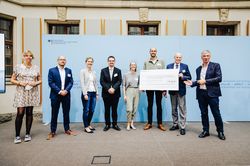
On Wednesday, 6 July 2022, State Secretary Stefan Tidow handed over grant approvals to eight AI projects in an official BMUV event. One of these so-called AI lighthouses is the WindGISKI project, in which our Organization & Innovation group is involved under the leadership of Prof. Dr. Jannika Mattes. The aim of the project is to develop and evaluate an AI-based geoinformation system that can be used to identify potential areas of wind energy more precisely. The project was highlighted by Stefan Tidow, State Secretary at the BMUV, especially because of its topicality. At the subsequent get-together in the BMUV Nordhof, Dr. Kirsten Kappert-Gonther (Member of the Bundestag) also emphasized the opportunities that come with an interdisciplinary research team like that of WindGISKI. The working group at the University of Oldenburg brings a social science perspective to the project and was represented at the meeting by doctoral student Tamara Schnell (in the center of the photo).
Jannika Mattes gives the keynote lecture ”Innovation in organizations and in societies” at the Workshop on Bridging International Societal Differences in Autonomous and Digitalized Energy Systems on 28 June 2022.
The workshop will be hosted as part of Hybrid Hub at ACM e-Energy 2022 conference.
Rohe, Sebastian; Oltmer, Marie; Wolter, Hendrik; Gmeiner, Nina; Tschersich, Julia (2022): Forever niche – Why do organic vegetable varieties not diffuse? In: CIRCLE Papers in Innovation Studies, No 2022/08

Why are there a hundred varieties of organic milk in the supermarket but only one variety of organic zucchini? To answer this question, Sebastian Rohe and Marie Oltmer from our working group “Organization & Innovation” investigated the barriers to the diffusion of organically grown vegetable varieties in food retail, together with colleagues from the Department of Ecological Economics (also at the University of Oldenburg) and from the University of Utrecht (Netherlands).
The work has now been published as a PrePrint. For the study, the team of authors talked to growers, farmers and supermarket buying agents. Organic vegetables in the supermarket are usually based on varieties that have been bred specifically for conventional agriculture and patented by international corporations. This is different for organic vegetables. Nevertheless, organic vegetable varieties are not offered in supermarkets. The results show that important stakeholders lack basic understanding of the benefits or even knowledge about the existence of the varieties. At the same time, the varieties are not competitively priced. The added value of organic vegetable varieties is difficult to communicate, in part because there is no universally recognized label for the varieties. There is no proactive market building by investors or retailers. Instead, other sustainability issues are on the agenda. Because of these challenges, most suppliers of organically grown vegetables do not even aim for the supermarket & develop niche marketing channels. However, this in turn severely limits the diffusion potential of the vegetables (and their ecological benefits).
The full results of our research can be viewed here: dx.doi.org/10.13140/RG.2.2.19325.03049
26 May 2022 Camilla Chlebna - Guest lecture in seminar CCRI – Countryside and Community Research Institute, University of Gloucestershire
Camilla Chlebna: ‘Competing terms for complementary concepts? – Acceptance, legitimacy and trust in regional energy transitions’. Guest lecture in the seminar CCRI – Countryside and Community Research Institute, University of Gloucestershire, Great Britain. Online. 26 May 2022.
Eu-SPRI Conference, May 9th-10th, 2022, Manchester
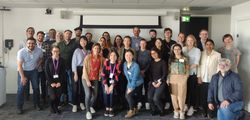
Marie Oltmer präsentierte das gemeinsame Paper von ihr und Camilla Chlebna mit dem Titel „Putting insects on the agenda – The role of policy entrepreneurs for insect conservation in Germany” auf der Eu-SPRI 2022 Konferenz für NachwuchswissenschaftlerInnen in Manchester, Großbritannien. Sie gewann dabei den zweiten Platz beim Best Presentation Award.
16 March 2022 - New WindGISKI project team member
Tamara Schnell has joined the working group Orgnisation & Innovation in the WindGISKI project. Please find more information on her website.
20 - 23 September 2021 Perspectives on the Social Embeddedness of the Smart Grid Architecture Model in Innovation Projects
Julia Köhlke, Sabrina Paustian, Jannika Mattes, Sebastian Lehnhoff, Mathias Uslar 'Perspectives on the Social Embeddedness of the Smart Grid Architecture Model in Innovation Projects’. CIRED 2021/online. 20 – 23 September 2021.
REENEA final workshop with interview partners and stakeholders from the energy sector
Sharing and discussing research results with our interview partners and guests from the energy sector - that was the goal of the digital REENEA final workshop on 29.09.2022. For this purpose, the REENEA team presented research results on the fragility of regional transition processes, changing networks and actor strategies that can slow down or also accelerate the transition process to the approximately 20 participants.
In two workshop sessions on "Spatial Planning & Wind Energy" and "Sector Coupling & Hydrogen", the REENEA team also provided insights into current research projects. These were complemented by short impulses from Karin Potthoff (Regional Planning North Hesse), Florian Kischka (Regional Planning Office Uckermark-Barnim) as well as Melanie Koch (GP Joule) and Marko Bartelsen (Energie des Nordens).
The speakers emphasized the complexity of planning processes and the importance of communication and information of the different actors involved. The integration of heterogeneous actors, according to the contributors of the second session, is also of great importance for sector coupling projects, to ensure regional acceptance.
The REENEA project will run until June 2023. If you are interested in our publications, do not hesitate to contact us. Please find our workshop presentation here.
International, scientific workshop to conclude the REENEA project in Oldenburg.
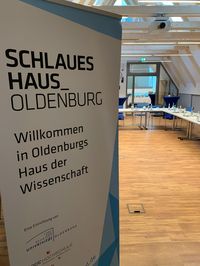
After almost five years, the research project REENEA ("Regional Energy Transition") is entering the home stretch. Therefore, the REENEA team hosted a final scientific workshop to discuss current research topics with an international scientific community. Many of the 12 scientists from Denmark, Germany, Norway, and Switzerland had already accompanied and supported the REENEA project in various functions over the last years.
The workshop took place at the “Schlaues Haus” at the city center of Oldenburg from September 21st to 22nd. In a total of three sessions, we discussed about actors and institutions in transition processes, about the "Phase II" of energy transition (which is, among other things, characterized by hydrogen and sector coupling activities), and about geographical multi-level dynamics of energy transitions. These three topics reflect the wide range of scientific debates to which the REENEA project was able to contribute during its runtime and continues to contribute. As part of the project, the team conducted a total of over 200 interviews with experts, analyzed other data using a wide variety of methods, and published 7 articles in international peer-reviewed journals to date. Fortunately, the REENEA project has been extended by the DFG ("Deutsche Forschungsgemeinschaft") until mid-2023, so that further results from the REENEA project can be evaluated in scientific publications in the coming months. The stimulating discussions from the workshop have provided us with many new impulses for this.
8 - 9 July 2021 Lecture at the virtual meeting of the German Sustainability Science Summit 2021
Jannika Mattes: 'A geography of innovation perspective on regions in sustainability transitions‘. Contribution to the Panel “Spatiality in sustainability science: Contrasting perspectives to accelerate transformation” at the virtual German Sustainability Science Summit 2021, 8.-9.7.2021.
10 June 2021 Lecture at the virtual Annual Meeting 2021 of the section Organisationssoziologie (Deutsche Gesellschaft für Soziologie): „Große Herausforderungen“ und Organisationen: Themenfelder, Theorien und Methoden im Umbruch
Jannika Mattes and Sabrina Paustian give the lecture "Standardisierung durch Digitalisierung im Energiesektor – Der Umgang mit Standardisierung in kollaborativen Innovationsprozessen"
12 May 2021: Lecture as part of the series on the transformation of the energy system at Leibniz University Hannover
Prof. Jens Köhrsen and Prof. Jannika Mattes give the lecture "Local energy transition processes - a sociological perspective".
Invitation to "Conversations on the Social Embeddedness of Digital Technologies"
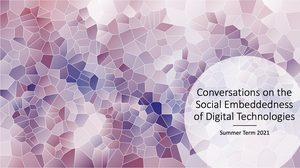
The conversations are part of the research training group “Social embeddedness of Autonomous Cyber Physical Systems (SEAS)” and the research center “Human Cyber-Physical System (HCPS)” with the cluster “Human – Technology – Society”. The target group of the conversations are members of SEAS and HCPS. Moreover, the conversations will be also attractive for undergraduate and graduate students and researchers from disciples such as Social Science, Computer Science, Health and Neuroscience.
21.01.2021: Camilla Chlebna: ‘The fragility of regional energy transitions’. Presentation at CREST (City and Regional Sustainability Transitions) webinar by the Regional Studies Association / online.
Press Release 389/18 University of Oldenburg:
Lower Saxony Research Prize for Sociologist Jannika Mattes (21 November 2018)
Prof. Dr. Jannika Mattes, Junior Professor at the Institute for Social Sciences, University of Oldenburg, was awarded the 2018 research prize by the Lower Saxony Ministry of Science and Culture. The prize was designed for personalities that make significant contributions through their outstanding scientific work as well as in the field of university development. The jury appreciated Jannika Mattes' research on entrepreneurial innovation strategies and societal change with regard to energy transition.
Presentation at the Congress of the German Sociologists’ Association in Göttingen (September 2018)
Jannika Mattes, Camilla Chlebna, Meike Löhr, Sebastian Rohe attended the 39th Congress of the German Society for Sociology (DGS) in Göttingen (24.-28.09.2018) with a lecture on 'Regional Transition Fields: Energy Change as a Social Process'. The presentation took place in the joint event of the sections Organizational Sociology and Science and Technology Research, which was entitled "Innovation Fields. Fields of Action for the Coordination of Complex Innovations". In the discussion of the various contributions, it became clear how difficult it is to empirically break down and apply the concept of Strategic Action Fields. At the same time, the various field-theoretical approaches worked as a good link between the very different research areas.
Energy transition: actors in flow
(6 September 2018)
At the Science Soirée, the audience is appointed in a lottery. Jannika Mattes presented empirical results from the Oldenburg case study of the REENEA project in front of about 30 people. In the discussion that followed, it particularly became clear how important also interested citizens regard social science research in relation to energy transitions.
'Internationalisierung der Arbeit - Innovationsprozesse in multinationalen Konzernen' (15 May 2018)
In the course of the event 'Zukunft der Arbeit' organised by the cooperation centre 'University - Trade Unions' Jannika Mattes elaborates on innovation processes in multinational groups. The event takes place on the occasion of the research year 2018 'Arbeitswelten der Zukunft'.
Energy Systems in Transition – The Role of Actors in Regional Change Processes (3 and 4 May 2018)
On 3rd and 4th May an introductory kick-off workshop organised by the project team of the DFG funded REENEA project led by Prof Jannika Mattes took place at University of Oldenburg. Ten internationally renowned transition scholars followed the invitation to the event titled “Energy Systems in Transition – The Role of Agents in Regional Transition Processes” and gave inspiring talks. Discussions amongst participants immediately after the talks were lively and continued informally over coffee and cake. The REENEA team gained important insights on the relations between agents and institutions and on the relevance of the regional level in wider reaching transition processes. The team wishes to thank the Jean Monnet Centre of Excellence “Europeanising Coastal Regions” for the financial support of the workshop.
'Regionaler Energiewandel unter der Lupe - Die Rolle der Akteure' (28 April 2018)
Jannika Mattes lectures on regional energy transition in the "Uni am Markt", organised by the Center for Lifelong Learning (C3L).
Uni-Info 1/2018 - Den Wandel verstehen
Article from the university magazine 'uni-info' on the research project 'Regional Energy Transition'.
Newspaper article of 28 December 2017 (Nordwest-Zeitung)
Regional energy transition as a social process
Thanks to the renowned Emmy Noether-programme, sociologist Prof. Dr. Jannika Mattes may establish her own junior research group.
Focus online article of 27 December 2017:
Sociologist Jannika Mattes joins Emmy Noether-programme of the German Research Foundation (DFG).
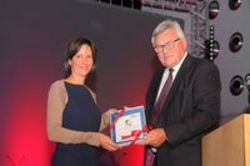
19 October 2017
Prof. Dr. Jannika Mattes was awarded the “prize for excellent research 2017” by the Universitätsgesellschaft Oldenburg e. V. (UGO) as part of the opening session of the academic year 2017/18. The prize was endowed with 5,000 € and honors her contributions to international innovation research in a combined organizational and regional perspective.
September 2016:
Jannika Mattes was granted a junior research group on Regional Energy Transition: The social processes of negotiating, norming and learning in the wind energy sector. Kickoff will be in January 2018. The project will be funded with 1.3 million Euros by the DFG (German Research Foundation).
26 April 2016:
Jannika Mattes and Martin Heidenreich: Die soziale Konstruktion einer Branche in kollaborativen Innovationsprozessen. Presentation in the research colloquium „Aktuelle Themen zur Windenergieforschung“ of the wind energy research centre ForWind, Oldenburg.
25 and 26 February 2016:
Martin Heidenreich and Jannika Mattes: Die soziale Konstruktion der Windenergiebranche in verteilten Innovationsprozessen. Presentation at the conference „Kollaborative Innovationen“ (Final conference of the project Collaborative Innovations), Göttingen.
28 - 30 January 2016:
Teis Hansen and Jannika Mattes: Beyond reciprocal proximity effects: the role of power. Presentation at the 3rd Geography of Innovation Conference, Toulouse, France.
10 December 2015:
Mattes, Jannika: Energietransition unter der Lupe. Presentation as part of the series "Innovation und sozialer Wandel", Organisations- und Innovationssoziologie, University of Stuttgart.
26 - 27 November 2015:
Die doppelte Koordinierung verteilter Innovationen in und zwischen Organisationen. Eine Mikrofundierung governancetheoretischer Perspektiven. Presentation as part of the autumn conference, DGS-group Organisationssoziologie, Berlin.
30. September 2015:
Presentationas part of the research colloquium STəPS "Breaking down energy transition: The interplay of actors and subsystem in regional restructuration processes" at the University Twente.
12 June 2015:
Presentation 'Regionale Lernsysteme und die Transformation regionaler Energiesysteme', spring conference DGS Deutsche Gesellschaft für Soziologie, section „Wissenschafts- und Technikforschung“, TU Dortmund, Germany, from 12 to 13 June 2015
25 May 2015:
Presentation with Teis Hansen Beyond reciprocal proximity effects: the role of power at the RSA Annual Conference 2015, Università Cattolica del Sacro Cuore, Piacenza, Italien
January 2015:
Call for Applications Scholarships for the PhD program “Cultures of Participation”
22 January 2015:
Presentation at the TU Dortmund bei den Aktuellen Debatten der Techniksoziologie"Transformation regionaler Innovationssysteme"
May 2014: Doctoral programme "Cultures of Participation" has been approved
The doctoral programme "Cultures of Participation", headed by Prof. Dr. Martin Butler, has now been approved by the MWK. Jannika Mattes is among the group of professors who applied for this programme and will be involved in colloquia and thesis supervision.
December 2012: Research project COLLIN has now been approved
Starting in april 2013, COLLIN "Collaborative Innovations in inter-firm development processes" will investigate socially distributed innovation processes in the industries of renewable energy and information technology. Funded by the Volkswagen Foundation, the research project will be coordinated by the Jean Monnet Centre for Europeanisation and Transnational Regulations Oldenburg (CETRO) and the Soziologisches Forschungsinstitut Göttingen (SOFI).
Our website contain further information regarding the project.
November 2012: Affiliation to CIRCLE to be continued
Back in Oldenburg, Jannika Mattes will continue to work together with her colleagues in Lund, Sweden. This collaboration is to be formalised with an official affiliation from January onwards. Based on this, I am looking forward to many new research ideas and exciting conjoint work.
March 2012: Seminar in CIRCLE (Lund, Sweden) coming up!
Having arrived at CIRCLE, Jannika Mattes is giving a seminar on March 22nd. It is entitled "Organizing innovation in multinational companies: Selective, sequential and temporary strategies". You find the announcement, an abstract and more information on the venue here.
March 2012: Leaving for a research period in Sweden
Jannika Mattes is starting a research period of several months at the University of Lund, Sweden. She is going to be affiliated with the well-known institute CIRCLE, Centre for Innovation, Research and Competence in the Learning Economy. One important focus of the research in Lund will be to advance regarding the relationship between global value chains and regional institutional frameworks in developing countries.
November 2011: Research project on Regional Energy Systems is now starting
The research project with the acronym COMPOSITE has now started. In a collaboration with LATTS, Paris and EIFER, Karlsruhe, we will research how regions restructure in order to meet renewable energy aims. Financed by a French public agency, we will conduct theoretical and empirical work to find out how regional processes of readjustment occur. In a comparative perspective, we look at French and German, rural and urban regions. Jannika Mattes and the group in Oldenburg are responsible for the investigation of East Frisia (Ostfriesland). For more information, cf. Research.
August 2011: Scientific Retreat
In a scientific retreat, fellow researchers and Jannika Mattes had an in-depth discussion about a preliminary version of a project proposal Jannika is working on. The idea is to connect global value chains and regional institutional frameworks in order to show how regions learn in developing countries. Thank you very much to all participants for the fruitful, insightful and animated discussion!
May 2011: Post-Doc Fellow at the Hanse-Wissenschafts-Kolleg
Jannika Mattes is now post-doc fellow at the Hanse-Wissenschafts-Kolleg Delmenhorst. Together with three other awardees from the region, she will be an external fellow for the next three years.
March 2011: Jannika Mattes receives thesis award
Jannika Mattes has been awarded the Weser-Ems-Wissenschaftspreis by the Oldenburgische Landesbank. The award honours her PhD thesis "Innovation in multinational companies. Organisational, international and regional dilemmas" as a particularly praiseworthy piece of work.



